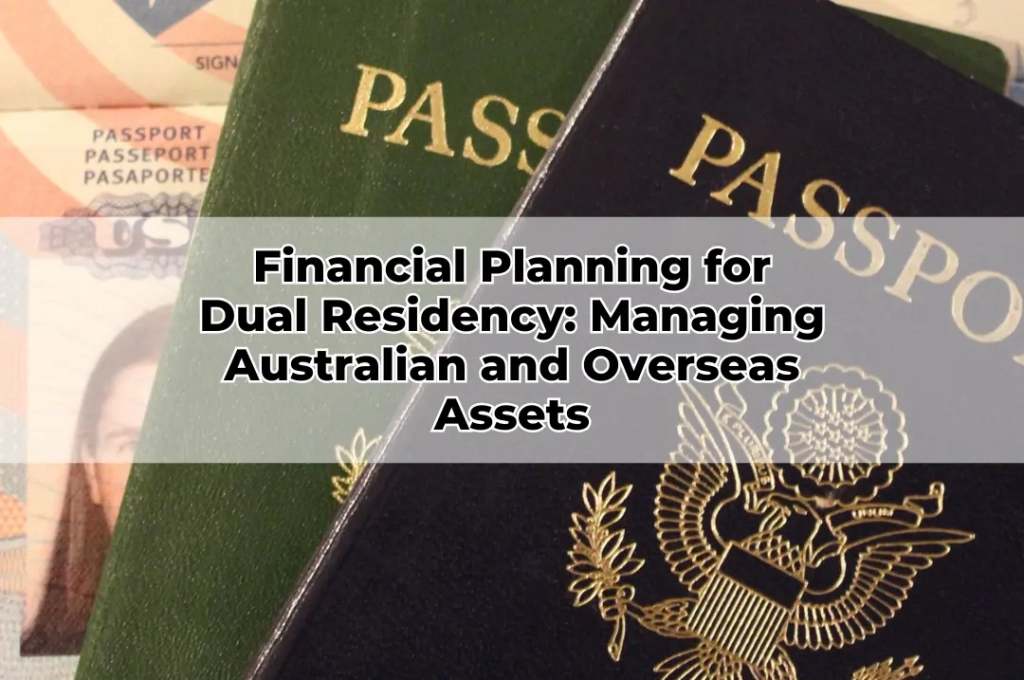Financial Planning for Dual Residency: Managing Australian and Overseas Assets
Table of Contents
ToggleDual residency refers to a situation where an individual resides in two countries, either permanently or for extended periods. This status often arises due to work, family ties, or investment opportunities. For those managing assets across two different jurisdictions, financial planning becomes increasingly complex. The need for careful management of Australian and overseas assets is critical, as individuals face unique tax implications, regulatory requirements, and investment strategies in each country.
This blog will guide dual residents through the essential considerations for financial planning in Australia and overseas. Whether you are an expatriate, have international business interests, or hold overseas property, understanding how to navigate the complexities of dual residency is key to ensuring long-term financial stability and compliance.
The Complexity of Dual Residency
Dual residency often results in an intricate relationship with tax laws in multiple countries. In Australia, residents are subject to income tax on worldwide income, while non-residents are taxed only on Australian-sourced income. For dual residents, determining tax residency can be tricky, and mistakes could lead to double taxation or penalties.
The first step is understanding how the tax treaties between Australia and your second country of residence affect your tax obligations. These treaties generally aim to eliminate double taxation by allocating taxing rights between the two nations. However, they can be nuanced, requiring expert advice to navigate effectively.
In addition to income tax, there are other areas where dual residents must comply with regulations, including inheritance taxes, capital gains taxes, and goods and services tax (GST). Proper guidance is essential to ensure that all tax filings are completed correctly and within deadlines.
Key Considerations for Managing Australian Assets
Managing assets in Australia while living abroad can present various challenges, particularly if you continue to earn income or have investments in the country. Property ownership, superannuation contributions, and income from Australian investments are all areas requiring careful attention.
For example, if you own property in Australia, you may be liable for capital gains tax (CGT) upon its sale, even if you no longer reside in the country. Similarly, contributions to your superannuation fund can affect your tax position, depending on your residency status. Staying informed about the rules around Australian assets and liaising with a financial adviser familiar with both Australian and international tax systems is crucial to optimise your financial position.
Managing Overseas Assets
When managing assets in a second country, the financial rules and regulations can be vastly different from those in Australia. For instance, tax rates, investment vehicles, and wealth transfer laws vary greatly from country to country. Understanding the nuances of each country’s financial landscape is crucial to ensuring that your assets are optimally structured and managed.
Investing in foreign markets also carries currency risks, particularly if there is volatility in exchange rates between Australia and your country of residence. Additionally, some jurisdictions may impose withholding taxes on foreign income, such as dividends or interest payments. A clear strategy to manage these risks is essential for safeguarding your assets and maximising returns.
Superannuation and Dual Residency
Superannuation is a central part of retirement planning for Australians. However, if you are living overseas or classified as a dual resident, you must understand how superannuation is impacted by your residency status. Contributions made to your super fund while abroad may be subject to different tax rates, and withdrawing your super may trigger additional tax liabilities.
The Australian government has made provisions for transferring superannuation balances to overseas pension schemes in some instances, which can be beneficial for dual residents. However, this process requires careful consideration of the tax consequences in both Australia and the country of residence. A financial adviser can help you navigate this process and ensure that your superannuation remains an effective retirement savings tool.
Currency Exchange Risk
Currency exchange fluctuations are one of the most significant risks for dual residents managing assets in multiple currencies. If you are earning income or holding investments in a foreign currency, changes in exchange rates can either erode or enhance the value of your assets when converted to Australian dollars.
For example, a strong Australian dollar could reduce the value of overseas assets, while a weak dollar may increase the value of these assets. Strategically managing currency exposure is a critical aspect of global financial planning, particularly for individuals with substantial holdings in international assets. Hedging strategies, such as foreign currency accounts or forward contracts, can be employed to mitigate this risk and protect your financial position.
Retirement Planning Across Borders
Retirement planning for dual residents can be particularly complex. Australians are required to contribute to their superannuation fund, while those living abroad may be eligible for retirement schemes in their second country of residence. The interplay between these systems must be managed carefully to ensure that both superannuation and overseas retirement funds work together to provide for a comfortable retirement.
Additionally, the tax treatment of retirement income can differ significantly between countries. For instance, certain countries may tax your overseas pension income more heavily than Australian superannuation benefits. To mitigate this, careful planning and an understanding of the relevant tax treaties is essential to avoid double taxation on your retirement income.
Investment Strategies for Dual Residents
Investing as a dual resident can be a balancing act between the different tax systems and market conditions of your two countries. Whether you’re investing in Australian shares, foreign bonds, or property abroad, you need to create a strategy that optimises your returns while complying with each country’s tax regulations.
Diversification is key in reducing risk, but it must be done in a way that aligns with your financial goals and the regulatory framework of both Australia and the foreign country. You may need to adjust your asset allocation based on how different asset classes are taxed or the financial stability of each country.
Working with a financial adviser who understands both Australian and international markets can help ensure that your investments are properly structured to minimise tax liabilities and maximise returns.
Estate Planning
For dual residents, estate planning becomes more complex due to the need to account for the laws of both Australia and the second country of residence. Wills, trusts, and inheritance laws vary widely between countries, and a single will may not suffice to cover all of your assets.
Dual residents must be particularly vigilant about estate taxes, as different countries may impose inheritance taxes on assets located within their borders. Additionally, the process of transferring assets across international boundaries can be fraught with legal complications. Ensuring that your estate plan is correctly structured and complies with both Australian and foreign laws is crucial for protecting your wealth for future generations.
Managing Foreign Income
As a dual resident, you may earn income from both Australia and abroad. Reporting foreign income accurately is essential to avoid penalties and ensure compliance with tax laws in both countries. In Australia, all worldwide income must be reported, and failure to disclose foreign income could lead to significant fines or even criminal charges.
Furthermore, some countries have stringent reporting requirements for foreign assets, including bank accounts, investments, and business interests. The complexity of international tax reporting is a primary reason why dual residents should work with a financial adviser who can assist with tax filings and ensure that all compliance requirements are met.
Working with a Financial Adviser
Given the complexity of managing assets in two countries, it is essential to work with a financial adviser who has experience in both Australian and international tax laws. A financial planner can help you understand the tax treaties, devise strategies for optimising your investments, and ensure compliance with all relevant regulations.
Choosing an adviser who is well-versed in dual residency issues is crucial. A specialist financial adviser can offer tailored solutions that consider both your Australian assets and those held overseas. They can help you mitigate tax risks, optimise your portfolio, and plan for a secure retirement, both in Australia and abroad.
Conclusion
For dual residents, managing Australian and overseas assets requires proactive financial planning. With the right strategy, dual residents can maximise the potential of their global assets, minimise tax burdens, and ensure that their financial goals are met.
By carefully navigating the tax implications, investment opportunities, and regulatory requirements in both Australia and their country of residence, dual residents can create a secure financial future. Seeking expert advice from a financial planner is essential to making informed decisions and optimising the management of assets across borders.









